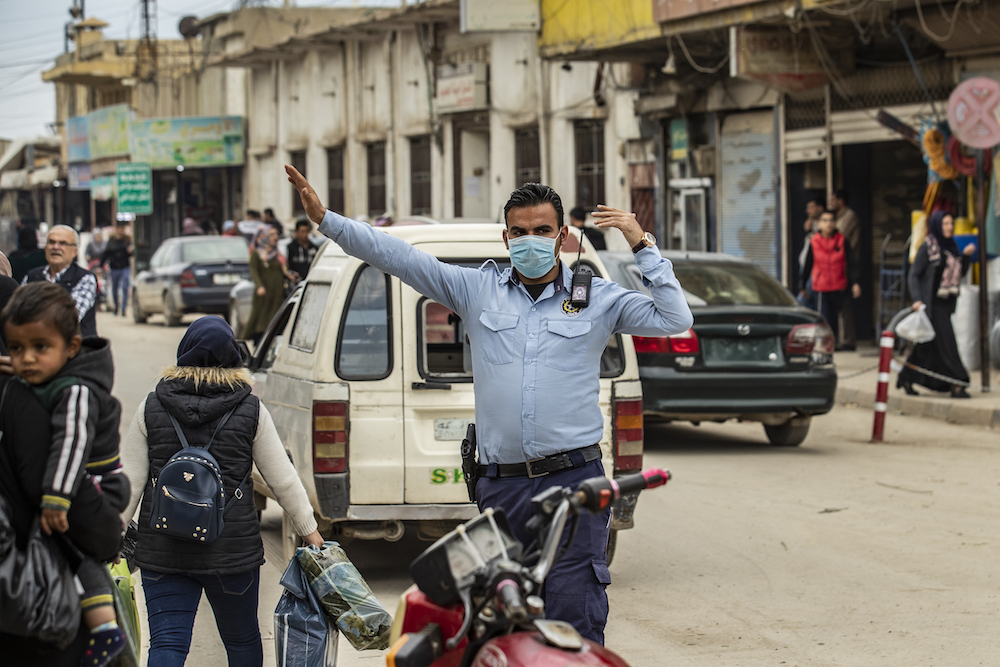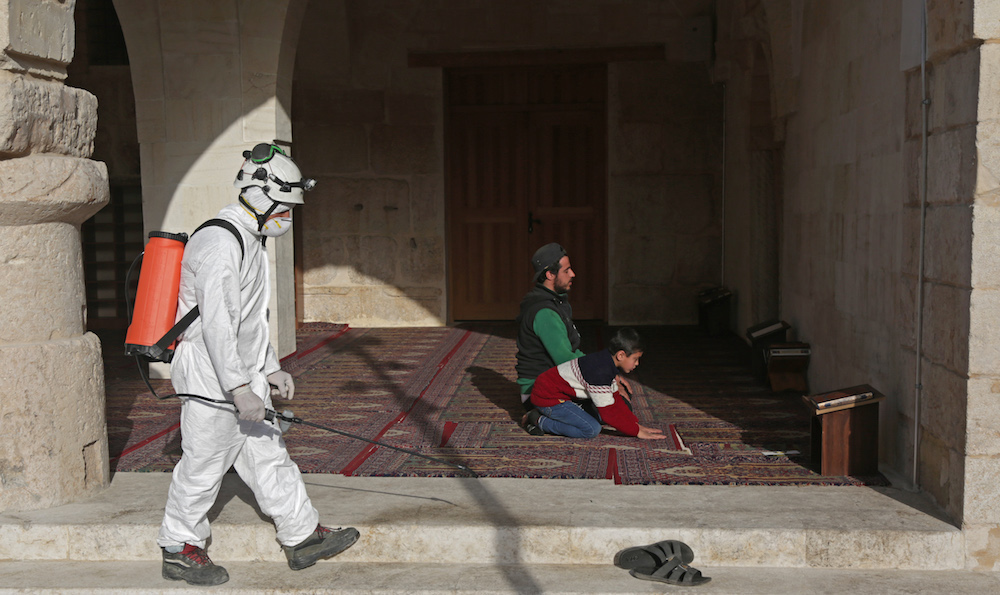Why coronavirus is a ticking bomb in war-ravaged northern Syria
ERBIL, Iraqi Kurdistan: As the coronavirus pandemic cuts a wide and deadly swathe through the Middle East and Asia, people in war-torn areas are pretty much sitting ducks, waiting to contract the infection.
Nowhere are crisis-ravaged communities more exposed to the deadly virus than in large expanses of Syria, especially in the country’s northwest and northeast.
Northern Syria is particularly vulnerable owing to dire humanitarian conditions and the risk of further conflict, analysts told Arab News.
The northwestern governorate of Idlib and the mostly Kurdish-controlled northeast, the two remaining areas outside the Syrian regime’s control, now face an invisible enemy.
Syria confirmed its first case on March 23, after insisting for weeks that the virus had not reached the country.
The regime had been waging an aggressive military campaign to retake territory in Idlib. For the past several weeks fighting has abated, especially after Turkey, which backs several rebel groups, reached a cease-fire deal with Russia, Syrian President Bashar Assad’s main military backer.
The hundreds of thousands displaced by the fighting have sought shelter in already overcrowded displacement camps, where conditions make it impossible for residents to practice social distancing or self-isolation.
Out of Idlib’s 2 million-plus population, at least 900,000 were displaced by the latest round of fighting between the regime and rebels.

“About a million people are displaced, living in tents along the Turkish border,” said Mustafa Gurbuz, a non-resident fellow at the Arab Center in Washington DC. “Social distancing is a luxury. There’s nothing called home, water shortage is pervasive, hygiene is impossible, and people are already suffering from poor health.”
Under the circumstances, if a COVID-19 contagion infects only a few people, it could spread very quickly.
“Only a few cases could result in an explosive outbreak. If the fragile cease-fire derails, a renewed conflict may cause more displacement, which could lead to further spread of COVID-19,” Gurbuz said, referring to the March truce that brought the fighting in Idlib to a halt.
The UN has called for a cease-fire across all of Syria so that efforts can be focused on preventing a major outbreak, which could affect the lives of millions of people living in deplorable and unsanitary conditions across the country.
Opinion
This section contains relevant reference points, placed in (Opinion field)
Aron Lund, a fellow with The Century Foundation, said Idlib is too disorganized and poorly equipped to handle an epidemic.
“There’s no coherent government, just a gaggle of militias half-heartedly strung together by a system of councils,” he said, adding that Idlib sorely lacks staff, medical facilities and medicine to cope with the likely effects of any significant outbreak.
Hundreds of thousands of people live cheek by jowl with each other in tent camps and decrepit buildings.
“Old people, who are most at risk of dying or falling very ill from the virus, are mixed up with children and have no way of isolating themselves for protection,” Lund said.

Furthermore, many people in Idlib have no access to clean or hot water, or necessities such as soap that can help prevent the spread of the virus.
To compound the crisis, the regime’s Russian-backed air campaign in Idlib saw repeated bombing of hospitals and health facilities, which has crippled the local health infrastructure and rendered it incapable of handling any outbreak.
When it comes to a COVID-19 outbreak, Idlib’s fears and vulnerabilities are mirrored by those of northeast Syria, most of which is controlled by the Kurdish-led Syrian Democratic Forces (SDF).
The news of the first death here — in a hospital in the city of Qamishli, which is under the regime’s authority — drew a strong reaction from the Kurdish Red Crescent and the SDF-backed Autonomous Administration of North and East Syria (NES) on Friday.
The Red Crescent lamented the “high risk of a large spread of the virus” due to announcement by the World Health Organization (WHO) of “the positive result after 15 days of the case.”

Joshua Landis, director of Middle East studies at the University of Oklahoma, describes the area as “a ticking time bomb for the coronavirus.”
For instance, on March 29 Turkey and its armed proxies, which occupy part of northeast Syria since launching an invasion last October, cut off water supplies to the area by shutting down the Allouk water station, on which 460,000 people depend.
If these supplies are indefinitely withheld, hundreds of thousands of local inhabitants could fall prey to coronavirus for much the same reason that makes many civilians in northwest Syria vulnerable.
“Tensions are extremely high as six armies are in a standoff: The Turkish Army, the Syrian Army, the SDF, the US Army, along with Russian and Iranian forces stationed in the region, not to mention the many proxy militias, which have their own agendas,” Landis said. “This makes getting aid to the region or coordinating policy impossible.”
The medical infrastructure in northeast Syria, which was at best primitive even before the uprising began in 2011, has been devastated by years of conflict.
The SDF began to enforce a lockdown on March 23 in an attempt to contain any spread of the virus.
However, it sorely lacks testing kits for detecting COVID-19 cases and determining which individuals or areas might have the virus and need to be strictly quarantined.
The US-led anti-Daesh coalition has partially addressed the issue through the supply of $1.2 million worth of medical supplies to help the NES, but that is unlikely to be even nearly enough.

In December, Russia and China used their veto power to prevent the UN Security Council from renewing permission for the delivery of aid to northern Syria from neighboring countries, in a move denounced as “callous” by Amnesty International, the human-rights advocacy group.
As a result, up to 400,000 medical items that would otherwise have been delivered to northeast Syria were left stuck in trucks in neighboring Iraq.
The Syrian regime, likely as part of a bid to pressure the SDF, has also prevented the flow of aid through Damascus.
The WHO says it has provided Syria with at least 1,200 testing kits, but the NES says Damascus has failed to provide protective equipment and artificial respirators.
This leaves the NES in a bind and more vulnerable to any outbreak given its heavy reliance on aid from the UN and NGOs, especially for the region’s displaced-persons camps and overcrowded prisons.
In the absence of a resumption of the flow of UN aid or unhindered passage of medical supplies through Damascus to NGOs, the meager resources of the NES are bound to become overwhelmed quickly in the event of an outbreak.
A coronavirus contagion in northeast Syria could also pose a very severe security threat to the region and possibly beyond.
“Some 10,000 Daesh fighters, along with close to 70,000 Daesh family members, are held in tight quarters, where social distancing is impossible,” said Landis.
At the very least, the situation in northern Syria is a big cause for concern as the pandemic causes havoc throughout the Middle East.
What is certain is that the pain and suffering of the war-weary people of Idlib and northeast Syria are unlikely to end anytime soon.










